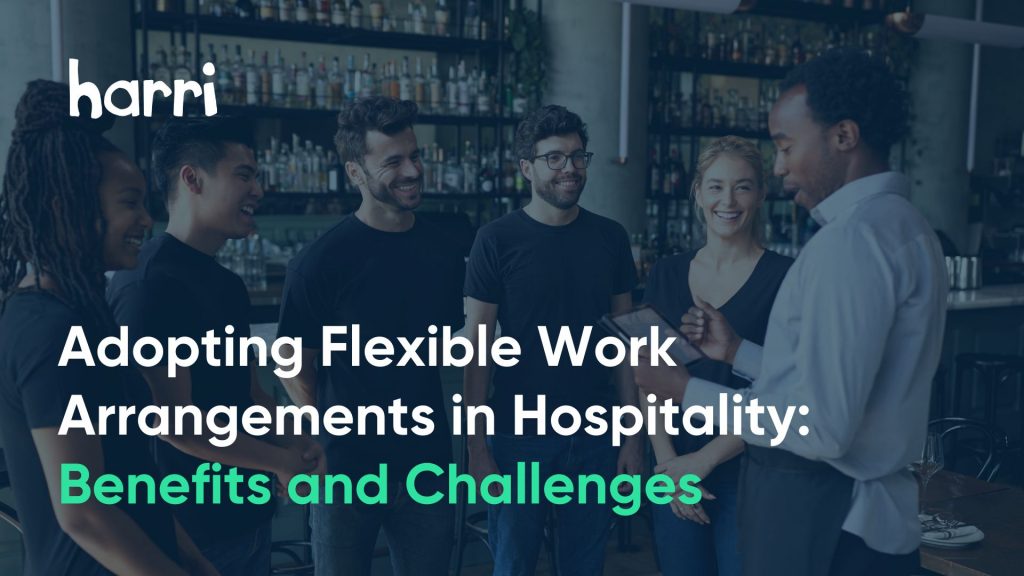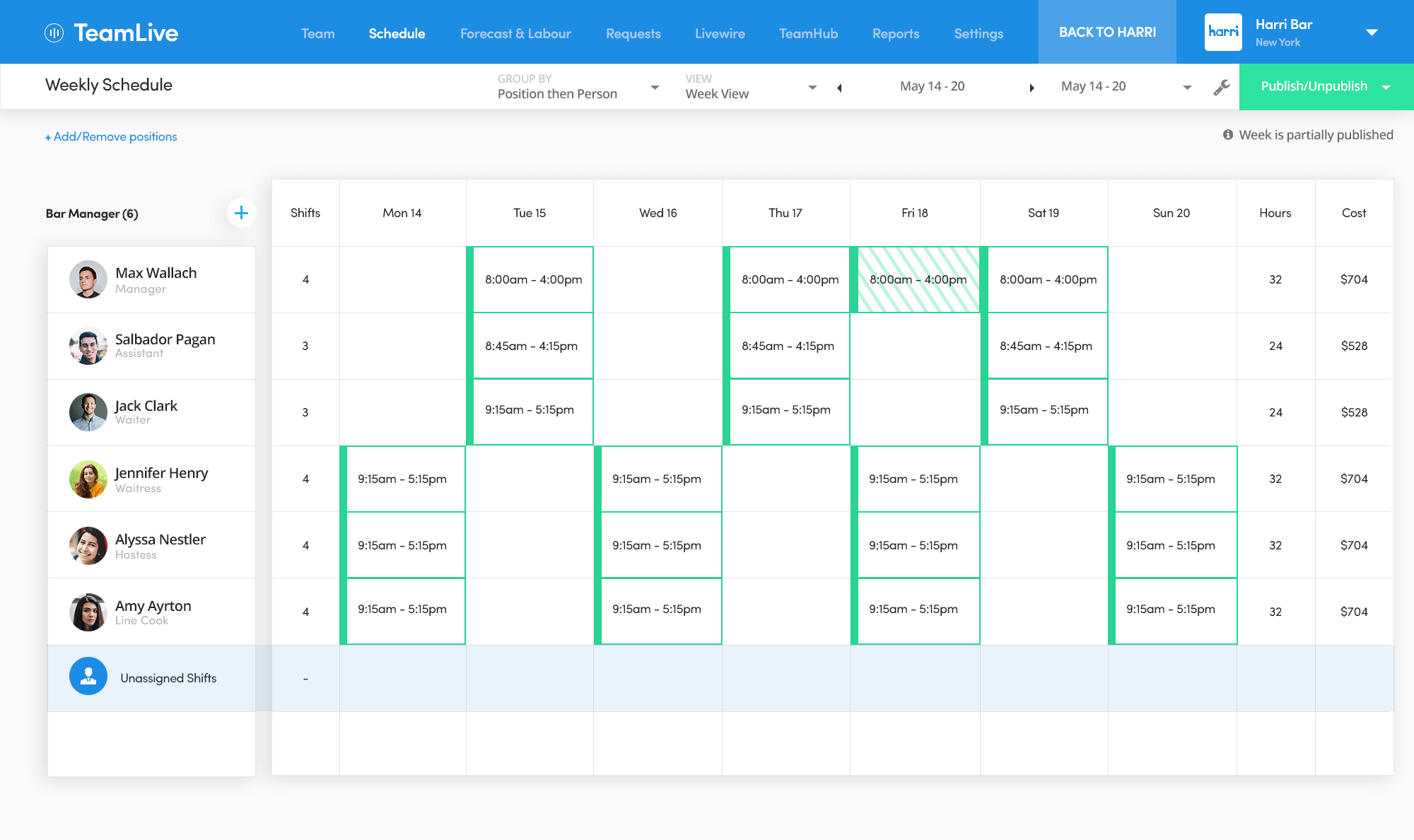Adopting Flexible Work Arrangements in Hospitality: Benefits and Challenges

- By Harri Insider Team | January 30, 2024
Offering flexible work arrangements constitutes a significant competitive advantage in the hospitality business. Flexibility attracts top-tier hospitality industry employees and then keeps them in the fold for mutual benefit. Though there are flexible work arrangement challenges of note, the advantages greatly outweigh the potential drawbacks.
Harri’s unique solutions help to facilitate a truly flexible work arrangement while simultaneously helping businesses like yours remain compliant with laws and regulations governing your workforce.
Transition to a flexible work schedule and you’ll find it is that much easier to attract workers who make a difference in service quality and profitability. Perhaps most importantly, flexible work schedules assist in retaining quality contributors for years or decades.

The Growing Need for Flexibility in Hospitality Work Schedules
Attitudes toward work are rapidly changing in response to changes in technology and society. Factor in the dynamics of the pandemic along with increased worker shortages within the industry and there is all the more reason to transition to flexible scheduling.
Like most industries, the hospitality industry has evolved over recent years and decades. Employee desire for flexible work schedules following a tightened workforce draws in high-quality staff as the competition for workers heats up.
Take a glance at the Transforming the Employee Experience in Hospitality report released by Harri in partnership with CGA and you’ll find hospitality worker priorities are highlighted by flexible hours and financial compensation. This fact is a bit surprising to some restaurant and hotel business owners and managers simply because there is a common misconception that money is the sole motivator of labor.
Defining “Flexibility” in the Service Industry
The word “flexibility” can connote a different meaning depending on the professional context. Flexible work hours at restaurants, hotels and other businesses constitute something completely different from conventional office roles in which people work at desks. In particular, hospitality industry scheduling is especially appealing to potential employees when they are provided with agency in the form of schedule blocking and shift swapping.
Provide your team with the option of swapping shifts and providing availability and you’ll likely find that both workplace morale and talent retention significantly improve. Flexible scheduling ultimately results in elevated employee satisfaction, improved adaptation to business demands that are constantly in flux and less employee churn. However, as detailed below, there are some challenges in adding flexible work hours including service quality standards and the management of a wide range of employee schedules.
By providing their work availability, employees can schedule their work hours around commitments such as classes, personal obligations and other work. Ideally, employees will be empowered to swap shifts using an in-house technology suite, like the Harri platform. If your business has not yet implemented this tech solution for workforce management and labor law compliance, now is the time to do so.
The most successful hospitality industry businesses are characterized by managers who make scheduling easy in every regard. As an example, employees greatly appreciate managers who generate schedules with ease and timeliness. A manager who proactively creates schedules and sends them to employees right away will find those contributors are more likely to show up for their scheduled shifts on time and also remain with the business across the long haul.
Communication tools should be readily available to facilitate interaction with managers and fellow employees. Try Harri’s work scheduling app and you’ll maximize flexibility, providing hospitality industry managers with the strategies necessary to structure shifts toward working models that are adaptable.
The added bonus is that the Harri platform ensures full compliance with applicable scheduling and labor laws including the nuanced requirements of the Fair Workweek legislation as detailed below.
Benefits of Flexible Schedules for Employees and Employers
Flexible work schedules pave a path toward employee satisfaction that makes the difference between a low and high retention rate. Pivot to flexible schedules and your business will find it is that much more capable of adapting to business demands.

Challenges in Implementing Flexible Work Arrangements
Implementing flexible work scheduling is not without challenges. Flexible work is rife with inherent complexities including potential reductions in service quality. There is also the challenge of juggling unique employee schedules for a balance between employee satisfaction and organizational utility. Achieving such balance is often what separates businesses with staying power from those that don’t stand the test of time.
Maintaining Consistency in Service with Varied Schedules
The strategy you choose for elevating service quality while allowing for employee scheduling flexibility might not be the same as that of your industry competitors. Some hotels and restaurants improve the guest experience with an employee-centered approach, emphasizing the need for flexible scheduling that improves personnel happiness for a higher quality work product.
After all, it is the quality of service that largely dictates customer happiness. In short, flexible scheduling makes happy employees who in turn make happy customers.
The degree to which your business implements flexible scheduling will ultimately be determined by ownership and managerial preferences combined with employee desires. Embrace the opportunity to empower your workforce and you’ll boost employee morale and improve employee engagement. Engaged employees who take pride in their roles maximize allegiance to the business.
When in doubt, lean toward giving employees more power over scheduling as their happiness dictates the quality of your company’s service and success. Restricting employee scheduling flexibility to the bare minimum has the potential to backfire, sending your talent to competitor businesses.
If you are still on the fence as to whether empowering employees to shape their schedule is important, consider the fact that such autonomy reduces absenteeism and tardiness. Flexible scheduling also inspires employees to recommend others for employment at your enterprise.
Navigating Compliance and Fair Workweek Regulations in Scheduling
Adherence to laws governing employee scheduling and labor is laden with challenges. As an example, Fair Workweek regulations are burdensome to businesses yet necessary for employee protection. Work scheduling apps including the Harri platform help support Fair Workweek compliance, which features automatically generated good-faith estimate documents, manager alerts, and real-time premium payment and labor cost reports.
Streamlining Hospitality Scheduling with Harri
The Harri platform is chock-full of helpful features that help businesses like yours create schedules in little time. Try our app and you’ll find shift swapping is easy. Moreover, our app facilitates clear and timely communication throughout the entirety of your team.
The Harri platform is a data-driven intelligent software scheduling system, meaning you never have to choose between maximizing sales and optimizing labor. Harri uses historical sales, and demand-based methodology to inform the precise labor mix needed at all of your locations in any given time period.
Empower your managers to easily configure and define shift-related rules, and enable automatic, direct, or pick-up shift functionality for employees to engage with. With the TeamLive app, employees can directly trade and swap shifts on the go right from their own cellphones or laptops.
When in doubt, take a look at the data and testimonials. The Harri platform has empowered businesses to create flexible work schedules for mutual benefit.
Harri’s platform helped Cafua Management Company complete a digital transformation, boosting employee morale and service quality at 225 locations. Cafua is the country’s largest privately owned Dunkin’ Donuts franchise, with more than 5,000 employees. The platform helped Cafua management access labor data for improved scheduling, facilitated full schedule management, and provided alerts about compliance and clear employee communication.
Embracing Flexibility as the Future of Hospitality Work
The time has come to transition from rigid employer-friendly scheduling to flexible employee-friendly scheduling. Modern hospitality businesses that transition to flexible work scheduling boost employee retention rate and also enjoy internal cohesion that leads to higher-quality service.
Harri is here to help your business implement flexible scheduling without delay. Try a demo of our platform at your business and you’ll seamlessly transition to flexible scheduling that ultimately improves your company’s bottom line.





















